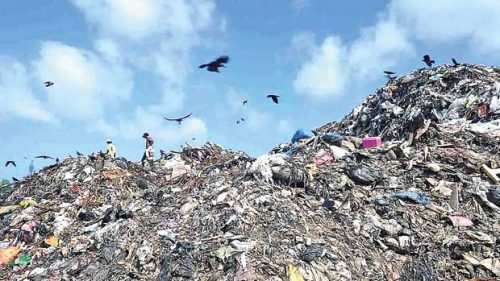Udaipur becomes first in Rajasthan to treat waste in natural way
In a first, garbage heaped on the dumping sites of the urban cities in the state of Rajasthan will be treated by natural processes of draining out moisture, stimulating the growth of microorganisms and degrading the waste in a cost-effective form.

In a first, garbage heaped on the dumping sites of the urban cities in the state of Rajasthan will be treated by natural processes of draining out moisture, stimulating the growth of microorganisms and degrading the waste in a cost-effective form.
The process called bioremediation has been introduced in Udaipur city for treating waste — garbage hill accumulated for several years; some of the heaps are more than a decade old.
The process has previously been used to treat garbage heaps in cities like Mumbai and Gurugram.
The project is being carried out by the Udaipur Smart City Limited in Udaipur as a part of the converged project with the local body. Pawan Arora, director and ex-officio joint secretary, local bodies said that the project is first of a kind in the city and is also worthy of being replicated in other cities once carried out in Udaipur.
Qummer Ul Zaman Choudhary, chief executive officer of Udaipur Smart City Limited said, “Open dumping of municipal solid waste quite often in scattered heaps not only occupies larger space, but also becomes a breeding ground for pathogens, flies, malodours and generation of leachate, which leads to water contamination.”
“Bioremediation or bio mining is usually used for old dumped waste that remains in a partly or fully decomposed state with no segregation in existence between wet and dry waste,” he added. In the cost effective method of bioremediation, treatment is done by dividing the garbage heap at the site into suitable blocks to let the air percolate in the heap.
As a result, the leachate which is the water in the heap with suspended solid particles is drained off and microbes are sprayed in t he heap to initiate biological decompositions. The waste is turned over several times in order to devoid the waste to leachate as much as possible. This biological decomposition of the waste decreases the volume of the waste by 40%.
Officials said that once the bio remediation process is carried out in full bio-mining will be carried out on the residual heap which is segregation of minerals and useful materials from mould of waste.
Until the new initiative was taken up, the treatment on the dumping sites was dependent on waste treatments like composting for wet waste and treating solid waste to create fuel, where a large amount of waste collected was left untreated in the dumping yard premises, said officials. The phenomenon created huge garbage heaps on the yards which are often 10 to 50 year old where no extra changes for installation or setting up of the treatment plant is required.
“Ranking of the garbage layer long spike harrows operating in cross directions is done regularly to pull out rags, plastics, rubber, textiles etc. Presently the segregation of waste is in progress. The resultant inert material is being transferred to Titardi landscapping site, the plastics are being baled and the rest of the waste segregated is being stocked at the site,” said Chaudhary. The cost of the work order is nearly Rs 4.98 crore in Udaipur and is likely to be completed in July.
Arora said that once the waste is completely treated, such sites can also be converted to a parks and gardens.
Source: The article has been reproduced unedited from Hindustan TimesTo join us on Facebook Click Here and Subscribe to UdaipurTimes Broadcast channels on GoogleNews | Telegram | Signal


